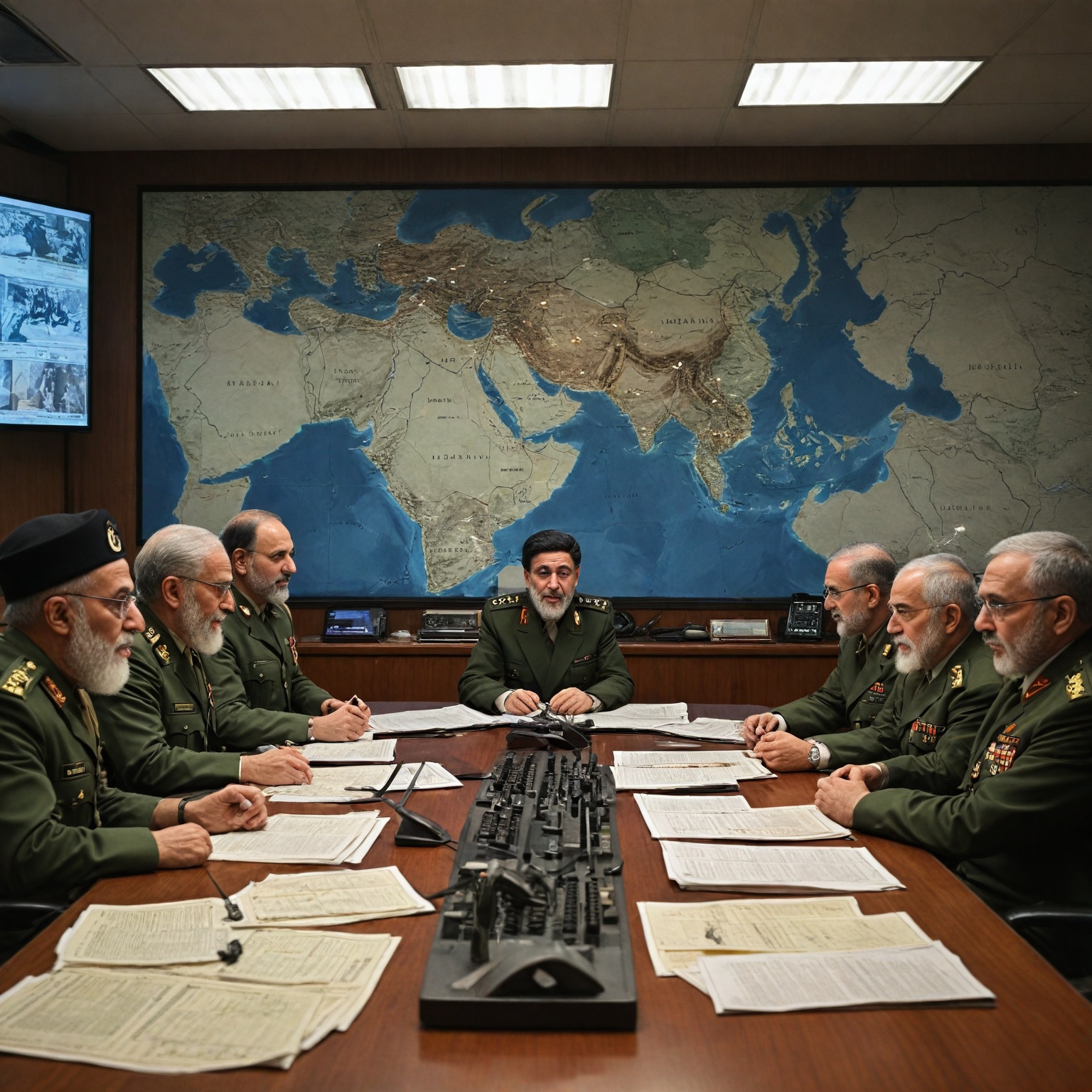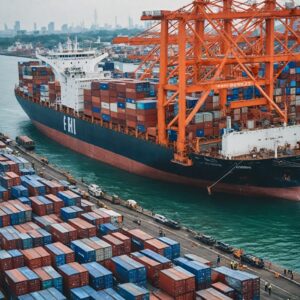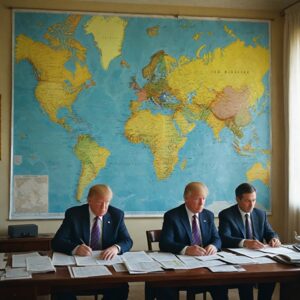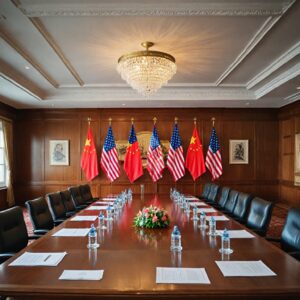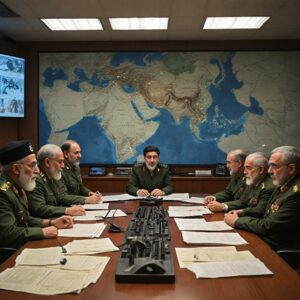Summary
The 2024 escalation of hostilities between Iran and Israel has intensified longstanding tensions marked by missile exchanges, targeted assassinations, and Israeli airstrikes on Iranian nuclear and military sites. Rooted in decades of conflict—including Iran’s backing of militant groups hostile to Israel and concerns over its nuclear program—this confrontation has drawn significant international attention due to its potential to destabilize the Middle East and disrupt global security. The conflict has further complicated delicate nuclear negotiations between Iran and the United States, with Israel’s military actions perceived by Tehran as attempts to undermine diplomatic progress.
In response to Israeli strikes and perceived U.S. involvement, Iranian leaders issued strong warnings that any direct American participation would result in “irreparable damage” and risk escalating the conflict into a wider regional war. Supreme Leader Ayatollah Ali Khamenei emphasized Iran’s resolve to resist external threats, framing the crisis as a matter of national sovereignty and dignity. Iranian officials also indicated readiness to broaden military operations beyond Israel, potentially targeting strategic sites such as the Persian Gulf, thereby threatening critical global energy routes and U.S. military assets in the region.
The international community has reacted with concern and calls for restraint. The United Nations Security Council convened an emergency session at Iran’s request, with global powers including Russia and China urging de-escalation to prevent broader instability. The United States has repositioned military forces defensively to protect its interests and assist Israel in missile defense, while publicly denying direct involvement in Israeli strikes. Regional and international actors, including Japan, the African Union, and the European Union, have condemned escalatory actions and emphasized the importance of diplomatic solutions to avoid a wider conflagration.
Analysts warn that the conflict’s trajectory risks severe regional destabilization and possible international escalation. Iran’s military warnings, combined with Israel’s mobilization and U.S. strategic considerations, create a volatile environment where miscalculation could lead to significant destruction. The situation remains fragile as diplomatic efforts continue amid ongoing violence, underscoring the urgent need for restraint to prevent irreparable damage to regional and global security.
Background
Tensions between Iran and Israel have escalated significantly in 2024, culminating in a period of direct conflict marked by missile strikes exchanged between the two countries and targeted assassinations by Israel in Iran and Syria. This escalation is rooted in long-standing animosities, including Iran’s support for Islamist militant groups such as Hezbollah, Palestinian Islamic Jihad, Hamas, and the Houthis, as well as Iran’s involvement in past attacks on Israeli and Jewish targets worldwide, including the 1992 Buenos Aires Israeli embassy bombing and the 1994 AMIA bombing. The Iranian nuclear program has also been a persistent source of tension, with ongoing concerns about Tehran’s ambitions despite international efforts to limit its development.
In May 2024, reports surfaced alleging that Iran orchestrated terror attacks targeting Israeli embassies across Europe, facilitated through local criminal networks. These activities were confirmed by the Swedish Security Service, highlighting Iran’s continued attempts to undermine Israeli and Jewish institutions beyond the Middle East. Concurrently, Israel launched airstrikes on Iranian strategic sites, including nuclear facilities such as the Natanz enrichment site and the Esfahan uranium conversion and fuel fabrication plants, although the International Atomic Energy Agency reported no elevated radiation levels following these attacks.
The conflict expanded into military engagements, with Israel claiming that certain targeted buildings also served as Iranian military communications centers. Air raid sirens sounded in Tel Aviv amid missile launches from Iran, signaling the intensity of hostilities. Amid this volatile situation, global powers have expressed deep concern. Foreign officials, including Japan’s Foreign Minister Takeshi Iwaya and representatives from the African Union, Russia, and the European Union, have urged restraint and condemned actions that escalate the conflict. The United States has responded by repositioning military assets in the region to protect its interests and assist Israel in intercepting Iranian missiles, while carefully balancing its military and diplomatic options.
This backdrop of regional hostility, proxy conflicts, and international diplomatic efforts sets the stage for the current heightened confrontation between Iran and Israel, with potential ramifications for broader Middle Eastern stability and global security.
Iranian Warnings and Official Statements
In response to escalating tensions and Israeli military strikes targeting Iranian sites, Iran issued multiple stern warnings highlighting the severe consequences of any further foreign involvement, particularly by the United States. Iranian officials emphasized that any U.S. participation would risk causing “irreparable damage” and could escalate the conflict into a broader regional war.
Iran’s Supreme Leader, Ayatollah Ali Khamenei, delivered a televised address condemning the Israeli attacks, asserting that “intelligent people who know Iran and the nation and history of Iran will never speak to this nation in threatening language because the Iranian nation cannot be surrendered”. Khamenei’s rhetoric underscored the resolve of Iran to resist external threats, framing the conflict as one of national sovereignty and dignity.
Additionally, Iranian military leadership expressed grave concerns about the potential consequences of increased U.S. involvement. An IRGC member briefed on strategic discussions revealed that Khamenei faced a critical choice between engaging in all-out war, which might jeopardize his long-standing rule, or a retreat that could be perceived as defeat domestically and internationally. Meanwhile, Iranian President Masoud Pezeshkian condemned the Israeli strikes as escalatory and highlighted the regional instability they provoked.
Iran’s Foreign Ministry directly accused the United States of coordinating and approving the Israeli strikes, warning that the U.S. would be held responsible for any dangerous fallout resulting from these “adventurism” actions. This accusation came despite repeated denials by the Trump administration of U.S. involvement in the attacks. Iranian officials also condemned the timing of the strikes, which coincided with ongoing nuclear negotiations between Iran and the U.S., alleging that Israel aimed to undermine diplomatic progress.
In the broader diplomatic arena, Iranian statements were echoed by aligned groups such as the Houthis in Yemen, who declared a high state of alert in anticipation of possible American escalation, warning that a wider conflict could plunge the region into chaos. Iran’s warnings also reflected a historical pattern of resistance against Israeli and American influence in the Middle East, with prior statements from Iranian military spokespeople cautioning against the use of force.
The Iranian government’s stance is reinforced by internal assessments and military preparations, including efforts to fortify against anticipated retaliation and to maintain strategic deterrence. Overall, Iranian official statements and warnings reflect a unified message that any escalation involving the U.S. would carry grave consequences, both regionally and internationally.
Potential Consequences According to Iran
Iran has issued stern warnings regarding the potential repercussions should the United States become further involved in the ongoing conflict between Israel and Iran. Tehran has indicated that it may escalate military actions beyond Israel, possibly extending the conflict to the Arabian Peninsula or disrupting the global economy by targeting strategic areas such as the Persian Gulf, a critical corridor for international oil shipments. Iranian short-range missiles pose a direct threat to U.S. military bases in the Middle East, while a barrage of long-range missiles and drones could be launched into Israel, potentially overwhelming Israeli air defenses and destabilizing regional security.
The Iranian regime’s strategy appears to be multifaceted, balancing military maneuvers with diplomatic considerations. Iran’s capability to intensify attacks creates pressure on the United States to reallocate missile defense systems toward protecting its Middle Eastern bases and allies such as Saudi Arabia, the United Arab Emirates, and Qatar. This diversion could, in turn, affect other global security concerns, including Western support for Ukraine, as resources are redirected away from European theaters.
Moreover, Iranian officials and allied voices have framed Western scrutiny of Iran’s nuclear program and attacks on its nuclear facilities as provocations that risk igniting a broader conflict. Russian politicians and parliamentary leaders have warned that escalation between Israel and Iran could edge the world closer to a global confrontation, possibly World War III. In response, Russia may increase military and humanitarian support to Iran to maintain its influence in the Middle East.
International diplomatic efforts have underscored the dangers of escalation. The United Nations Secretary-General condemned any military escalation, particularly Israeli strikes on Iranian nuclear sites amid ongoing negotiations between Iran and the U.S. The UN Security Council convened an emergency session to address the conflict, emphasizing restraint and caution to prevent wider instability. Similar concerns have been voiced by other international actors, including Japan’s foreign minister and the African Union, both condemning the escalation and calling for diplomatic solutions.
Responses and Reactions
The attack by Israel on Iranian targets triggered widespread reactions both regionally and internationally, escalating tensions across the Middle East. Oman condemned the strikes, describing them as undermining diplomatic efforts, while Israel prepared its civilian population for anticipated missile and drone reprisals from Iran and its proxies. Iranian leaders expressed a desire to respond to the Israeli attacks, but internal debates persisted over the nature and timing of any retaliation, especially considering the potential involvement of the United States and the possible costs of prolonged conflict.
Within Iran, Supreme Leader Ayatollah Ali Khamenei reportedly sought revenge against Israel but cautioned against hasty actions, reflecting divisions among Iranian officials on how best to proceed amid fears of US intervention. Iran’s Foreign Ministry accused the United States of coordinating and approving the Israeli strikes, holding Washington responsible for the dangerous consequences of Israel’s “adventurism,” though the US government firmly denied any involvement, emphasizing its priority to protect American forces in the region and distancing itself from the attacks.
The United States responded by repositioning warships and deploying additional military aircraft to the Middle East in a defensive posture aimed at protecting its personnel and allies. US Defense Secretary Pete Hegseth described these moves as precautionary, with American forces assisting Israel in intercepting Iranian missiles. Despite this military support, US officials and experts underscored the importance of avoiding direct involvement in the conflict, urging restraint to prevent escalation.
The Israeli government took significant preparatory steps, including the mobilization of tens of thousands of IDF reservists and the recall of all pilots involved in the strikes, indicating readiness for Iranian retaliation. Meanwhile, Iranian-backed groups, such as Hezbollah, and Iran itself have historically engaged in proxy conflicts with Israel, further complicating the regional dynamics.
Internationally, reactions varied. The United Nations Secretary-General António Guterres condemned any military escalation, particularly Israeli attacks on Iranian nuclear facilities occurring amid ongoing US-Iran nuclear negotiations. The UN Security Council held an emergency session at Iran’s request, supported by Russia and China, highlighting the global concern over potential broader conflict. Other international actors, including Japan, the African Union, Russia, and the European Union, called for restraint and condemned the escalation, warning against actions that could destabilize the region further.
Iranian officials and analysts noted that Israel’s attacks aimed to disrupt nuclear negotiations mediated by Oman, with Iranian authorities reporting significant casualties from the strikes, including civilians. Some Arab states expressed condemnation of the attacks primarily as a performative gesture intended to shield themselves from Iranian backlash, reflecting the complex geopolitical landscape.
Finally, prominent figures weighed in on the unfolding crisis. Former US President Donald Trump issued a warning to Iranians to evacuate Tehran, reflecting heightened tensions and the urgency of diplomatic engagement. The Atlantic Council highlighted the potential long-term impact of Iran’s weakening on the prospects for peace and regeneration in Gaza, as well as the possibility that Russia could benefit strategically from the conflict’s distraction of US resources and rising oil prices.
Analysis and Commentary
The recent Israeli strikes on Iran’s nuclear facilities have elicited a wide range of analyses and responses highlighting the potential for severe regional destabilization and international escalation. Jason M. Brodsky, policy director of United Against Nuclear Iran (UANI), emphasized the grave risks posed by attacks on nuclear sites, particularly regarding health and environmental consequences. The International Atomic Energy Agency (IAEA) confirmed that while Iran’s Natanz enrichment site suffered impacts, there were no elevated radiation levels detected, and similarly no changes in offsite radiation at the Esfahan site where multiple nuclear-related buildings were targeted.
Iran’s leadership, represented by IRGC Commander Major General Hossein Salami, issued stern warnings of a “tough, decisive and devastating reaction” to any further threats, underscoring the heightened possibility of military escalation in the region. This rhetoric was met with equally strong warnings from U.S. President Donald Trump, who indicated that America would hold Iran fully accountable and suggested the country faces a stark choice between negotiation and military confrontation. Meanwhile, U.S. military officials, such as Gen. Michael E. Kurilla, have acknowledged presenting a range of potential strike options to U.S. leadership, signaling the serious consideration of military responses.
The psychological and societal impact of the conflict was also evident, with reports from northern Israel indicating anxiety-related symptoms among civilians following attacks. International diplomatic actors and organizations expressed deep concern about the conflict’s potential to spiral. United Nations Secretary-General António Guterres condemned military escalations, particularly Israel’s strikes during ongoing diplomatic talks between Iran and the United States, calling for restraint to prevent further instability. The UN Security Council convened an emergency session, supported by major powers including Russia and China, to address the crisis. Several countries, including Japan, Germany, and Italy, condemned the attacks and urged a return to diplomacy, emphasizing the importance of preventing Iran’s nuclear weapon development through peaceful means.
On the diplomatic front, some Iranian officials indicated a willingness to show flexibility in nuclear negotiations conditional on Israel halting its military actions. Iranian deputy foreign minister Abbas Araqchi stressed that without a complete cessation of Israeli aggression, Iran’s responses would continue, underscoring the delicate balance between diplomatic engagement and military retaliation. Despite being informed ahead of Israel’s strikes, the U.S. did not participate militarily, which Iran’s foreign ministry criticized as rendering ongoing talks “meaningless” amidst the violence. The sixth round of nuclear talks scheduled in Oman remained uncertain amid these tensions.
Analysts have highlighted the risk of the conflict expanding beyond the Middle East. The United Nations nuclear watchdog indicated possible damage to Natanz’s underground centrifuge halls, raising the stakes of further conflict. European Union foreign policy chief Kaja Kallas warned that U.S. military involvement could trigger a broader regional war, a concern echoed by Russia’s potential to increase military and logistical support to Iran, further complicating the geopolitical landscape. Collectively, these assessments paint a precarious picture where military actions, diplomatic efforts, and international responses intertwine, with the potential for irreparable damage if escalation is not contained.

